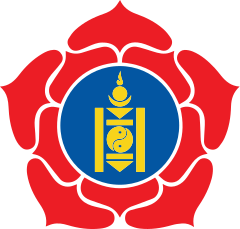More languages
More actions
No edit summary Tag: Visual edit |
No edit summary Tag: Visual edit |
||
| Line 10: | Line 10: | ||
Three days after the party was founded, Choibalsan and [[Soliin Danzan]] left to visit [[Russian Soviet Federative Socialist Republic (1917–1991)|Russia]]. A second group of Sükhbaatar, [[Dansrabilegiin Dogsom|Dogsom]], [[Darijavyn Losol|Losol]], [[Dogsomyn Bodoo|Bodoo]] and [[Dambyn Chagdarjav|Chagdarjav]] left soon after and met up with the first group on July 22 in Verkhneudinsk (now Ulaan-Üde) before going to Irkutsk. The party created a statement saying they would restore Mongolia's autonomy and abolish the rights of the [[Feudalism|feudal]] princes within two years while keeping the Bogd Khan as the nominal head of state. Some party members did not want to ally with the [[Communist Party of the Soviet Union|Bolsheviks]], including Bodoo, who represented the feudal officials, and Danzan, who represented the small [[bourgeoisie]]. In August, Danzan, Losol, and Chagdarjav went to [[Moscow]] while Bodoo and Dogsom returned to Örgöö and Sükhbaatar and Choibalsan stayed in Irkutsk.<ref name=":03">{{Citation|author=A. A. Guber, et al.|year=1973|title=History of the Mongolian People's Republic|title-url=https://archive.org/details/HistoryOfTheMPR/page/n116/mode/1up|chapter=The Mongolian People's Revolution and the Proclamation of the Mongolian People's Republic|page=278–81}}</ref><sup>:280–2</sup> | Three days after the party was founded, Choibalsan and [[Soliin Danzan]] left to visit [[Russian Soviet Federative Socialist Republic (1917–1991)|Russia]]. A second group of Sükhbaatar, [[Dansrabilegiin Dogsom|Dogsom]], [[Darijavyn Losol|Losol]], [[Dogsomyn Bodoo|Bodoo]] and [[Dambyn Chagdarjav|Chagdarjav]] left soon after and met up with the first group on July 22 in Verkhneudinsk (now Ulaan-Üde) before going to Irkutsk. The party created a statement saying they would restore Mongolia's autonomy and abolish the rights of the [[Feudalism|feudal]] princes within two years while keeping the Bogd Khan as the nominal head of state. Some party members did not want to ally with the [[Communist Party of the Soviet Union|Bolsheviks]], including Bodoo, who represented the feudal officials, and Danzan, who represented the small [[bourgeoisie]]. In August, Danzan, Losol, and Chagdarjav went to [[Moscow]] while Bodoo and Dogsom returned to Örgöö and Sükhbaatar and Choibalsan stayed in Irkutsk.<ref name=":03">{{Citation|author=A. A. Guber, et al.|year=1973|title=History of the Mongolian People's Republic|title-url=https://archive.org/details/HistoryOfTheMPR/page/n116/mode/1up|chapter=The Mongolian People's Revolution and the Proclamation of the Mongolian People's Republic|page=278–81}}</ref><sup>:280–2</sup> | ||
The group that arrived in Moscow met [[Vladimir Lenin|Lenin]], who said that Mongolia had to seek independence and ally with the [[Proletariat|workers]] and [[Peasantry|peasants]] of Russia. He criticized Danzan's [[Nationalism|nationalist]] views. In Mongolia, Bodoo began collaborating with [[Roman Ungern-Sternberg|Ungern]]'s feudal dictatorship.<ref name=":03" /><sup>:285–6</sup> | |||
=== People's Revolution === | |||
In November 1921, Lenin discouraged the newly founded MPP from changing its name to a communist party until the Mongolian [[proletariat]] embraced communism. In 1924, the party joined the [[Communist International (1919–1943)|Comintern]] as the Mongolian People's Revolutionary Party.<ref name=":02">{{Citation|author=[[Vijay Prashad]]|year=2017|title=Red Star over the Third World|chapter=Enemy of Imperialism|page=80|pdf=https://cloudflare-ipfs.com/ipfs/bafykbzacecu7gb2ei65us6ip3r2ugcgkblneqcftbm456mb6bzvprkbqk55qm?filename=Vijay%20Prashad%20-%20Red%20Star%20Over%20the%20Third%20World-LeftWord%20Books%20%282018%29.pdf|city=New Delhi|publisher=LeftWord Books}}</ref> | |||
== References == | == References == | ||
[[Category:Social democratic parties]] | [[Category:Social democratic parties]] | ||
Revision as of 22:56, 31 May 2024
Mongolian People's Party Монгол Ардын Нам | |
|---|---|
 | |
| Founded | 25 June 1920 |
| Political orientation | Social democracy Formerly: Marxism–Leninism |
The Mongolian People's Party (MPP) is a social-democratic party in Mongolia. Until 1990, it was a communist party known as the Mongolian People's Revolutionary Party (MPRP).
History
Formation
A joint meeting of Damdin Sükhbaatar's revolutionary group and Khorloogiin Choibalsan's Consul Group unified on 1920 June 25 to form the MPP. The initial party oath required each member to recruit at least 10 other members.[1]:279–80
Three days after the party was founded, Choibalsan and Soliin Danzan left to visit Russia. A second group of Sükhbaatar, Dogsom, Losol, Bodoo and Chagdarjav left soon after and met up with the first group on July 22 in Verkhneudinsk (now Ulaan-Üde) before going to Irkutsk. The party created a statement saying they would restore Mongolia's autonomy and abolish the rights of the feudal princes within two years while keeping the Bogd Khan as the nominal head of state. Some party members did not want to ally with the Bolsheviks, including Bodoo, who represented the feudal officials, and Danzan, who represented the small bourgeoisie. In August, Danzan, Losol, and Chagdarjav went to Moscow while Bodoo and Dogsom returned to Örgöö and Sükhbaatar and Choibalsan stayed in Irkutsk.[1]:280–2
The group that arrived in Moscow met Lenin, who said that Mongolia had to seek independence and ally with the workers and peasants of Russia. He criticized Danzan's nationalist views. In Mongolia, Bodoo began collaborating with Ungern's feudal dictatorship.[1]:285–6
People's Revolution
In November 1921, Lenin discouraged the newly founded MPP from changing its name to a communist party until the Mongolian proletariat embraced communism. In 1924, the party joined the Comintern as the Mongolian People's Revolutionary Party.[2]
References
- ↑ 1.0 1.1 1.2 A. A. Guber, et al. (1973). History of the Mongolian People's Republic: 'The Mongolian People's Revolution and the Proclamation of the Mongolian People's Republic' (pp. 278–81).
- ↑ Vijay Prashad (2017). Red Star over the Third World: 'Enemy of Imperialism' (p. 80). [PDF] New Delhi: LeftWord Books.
